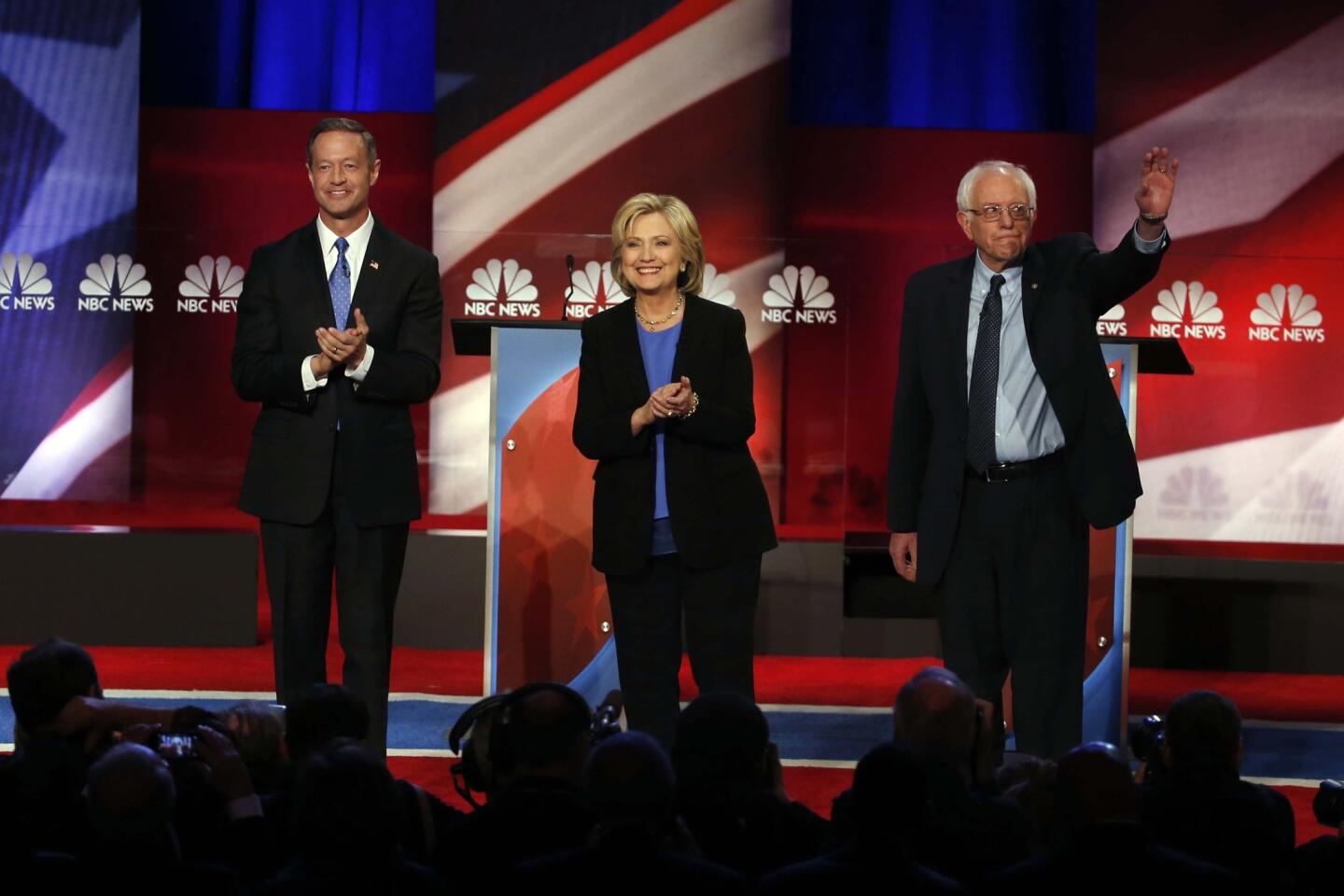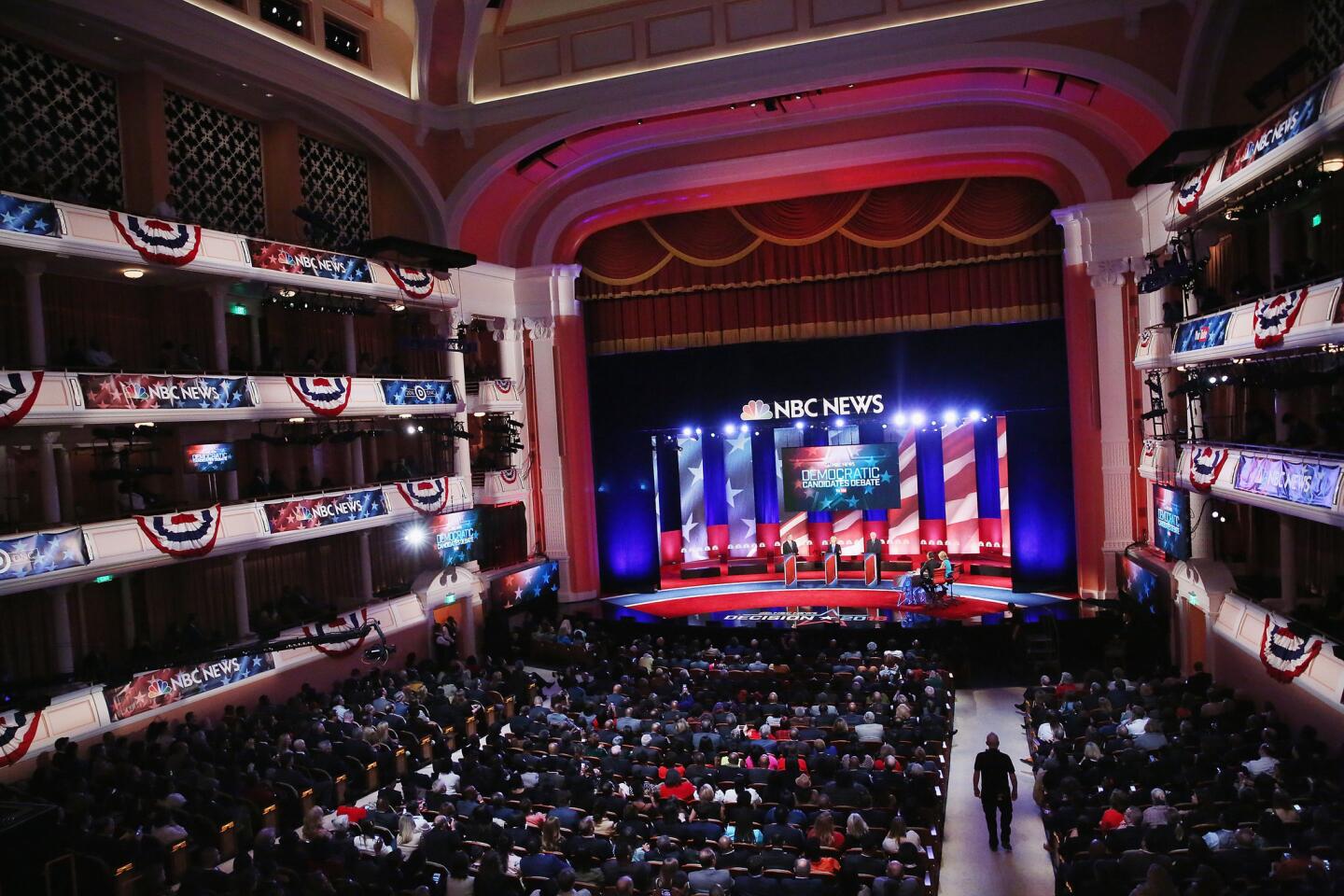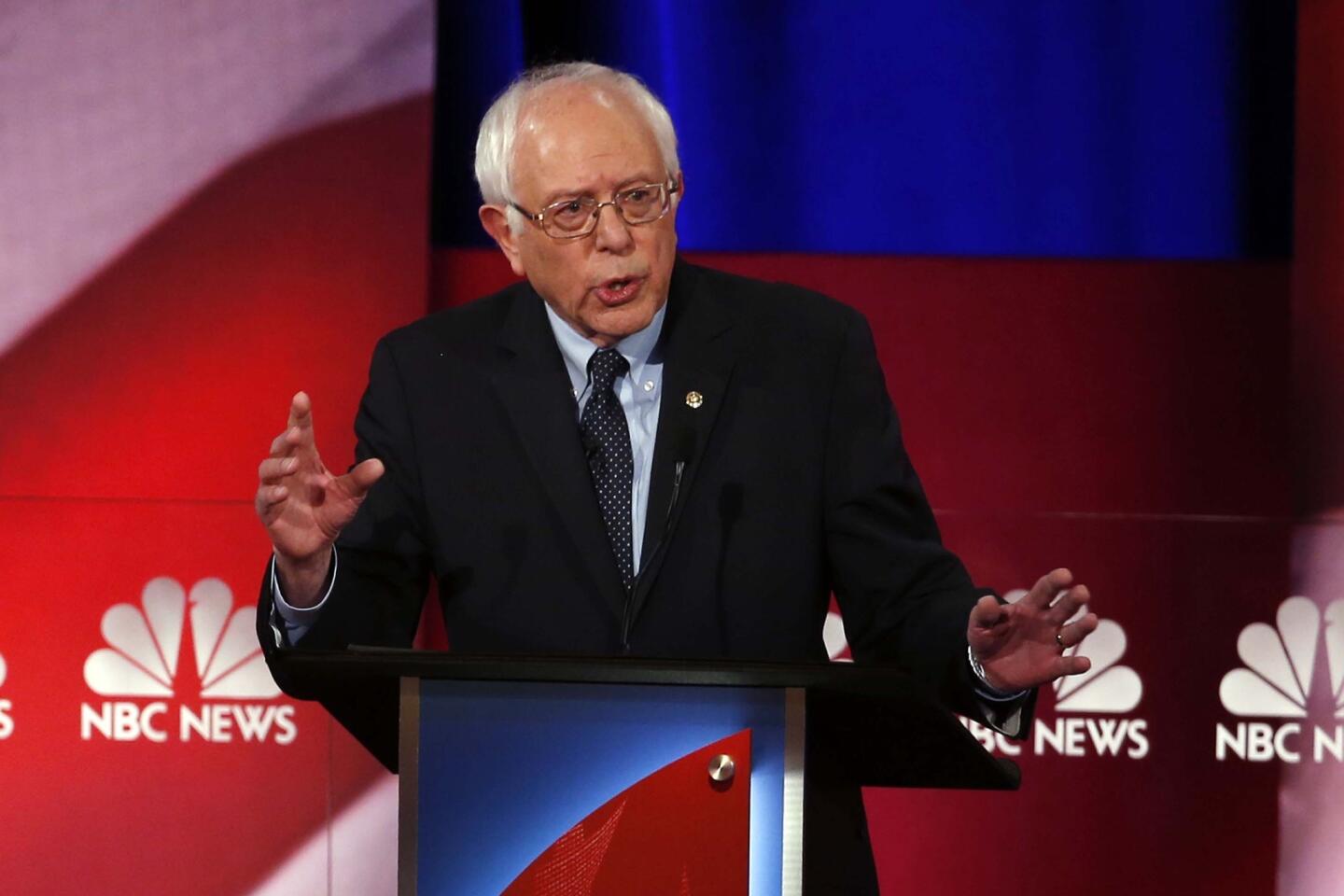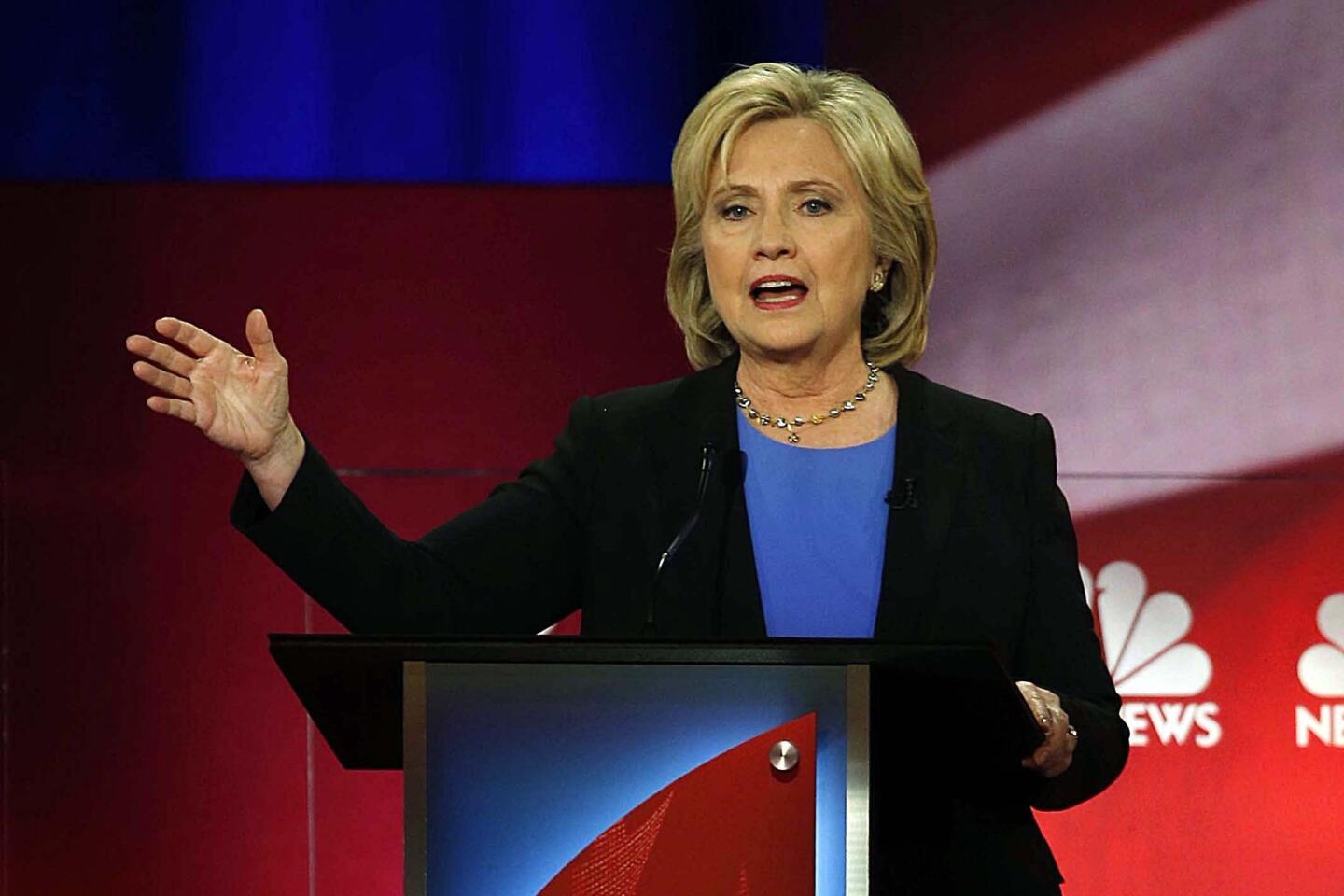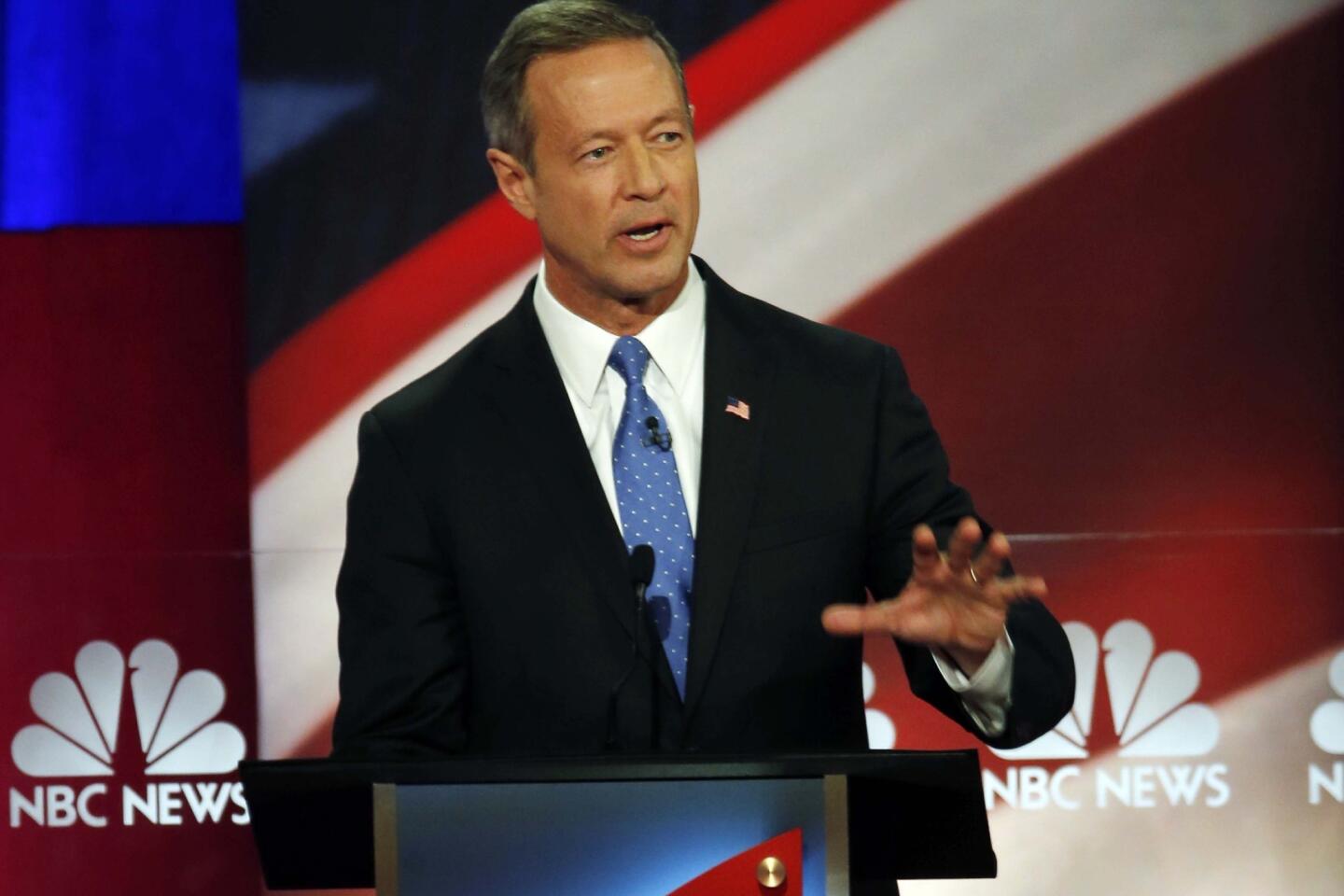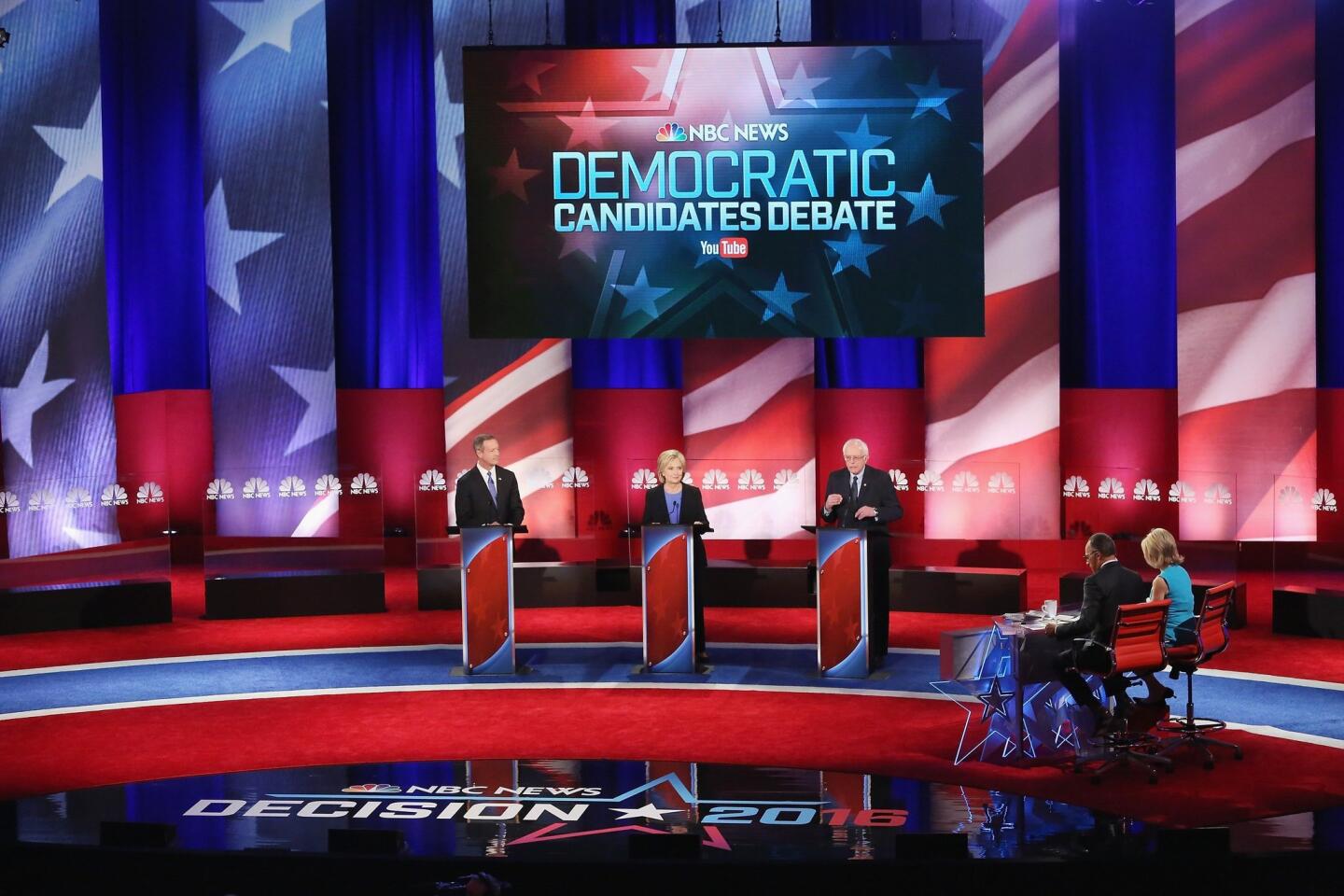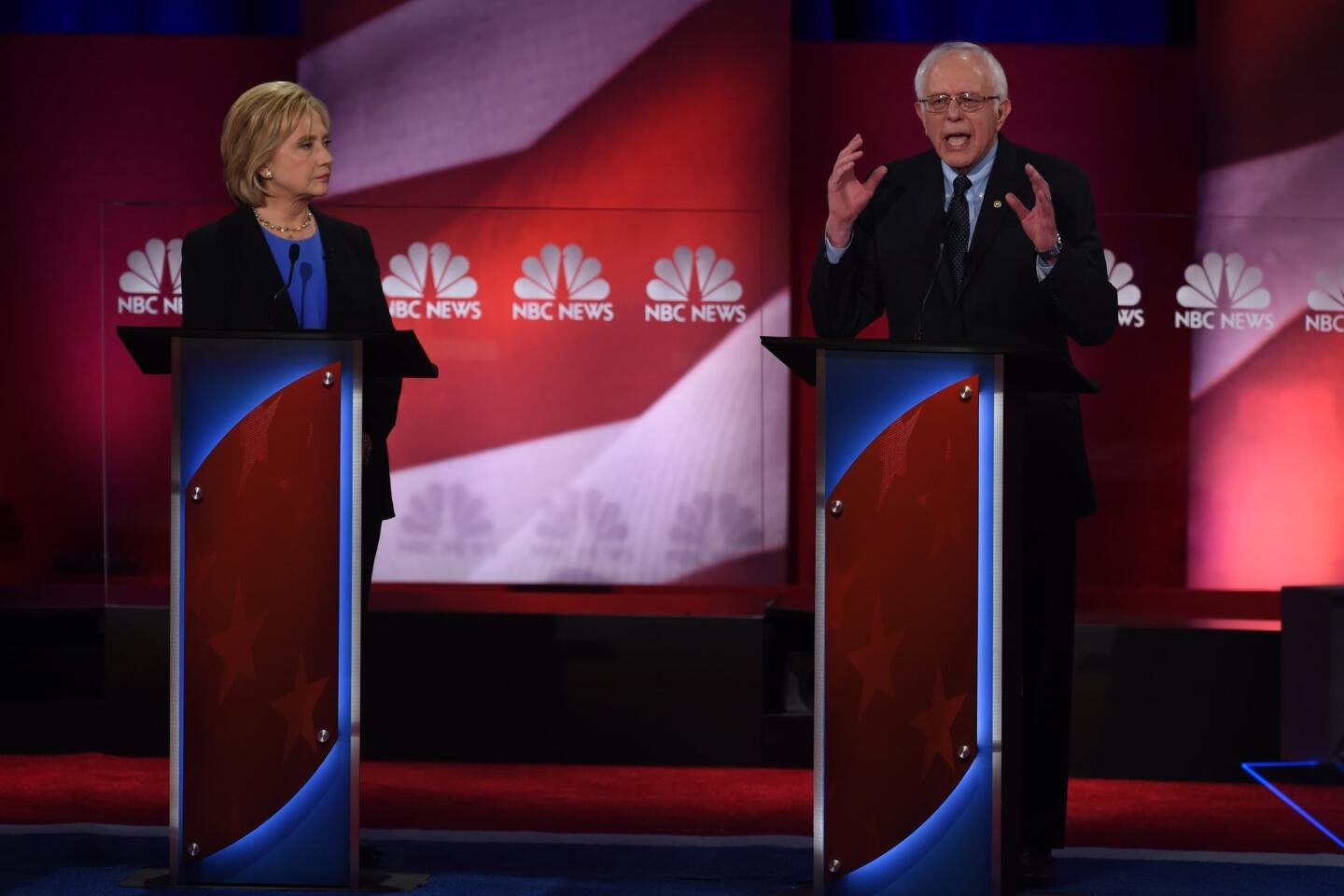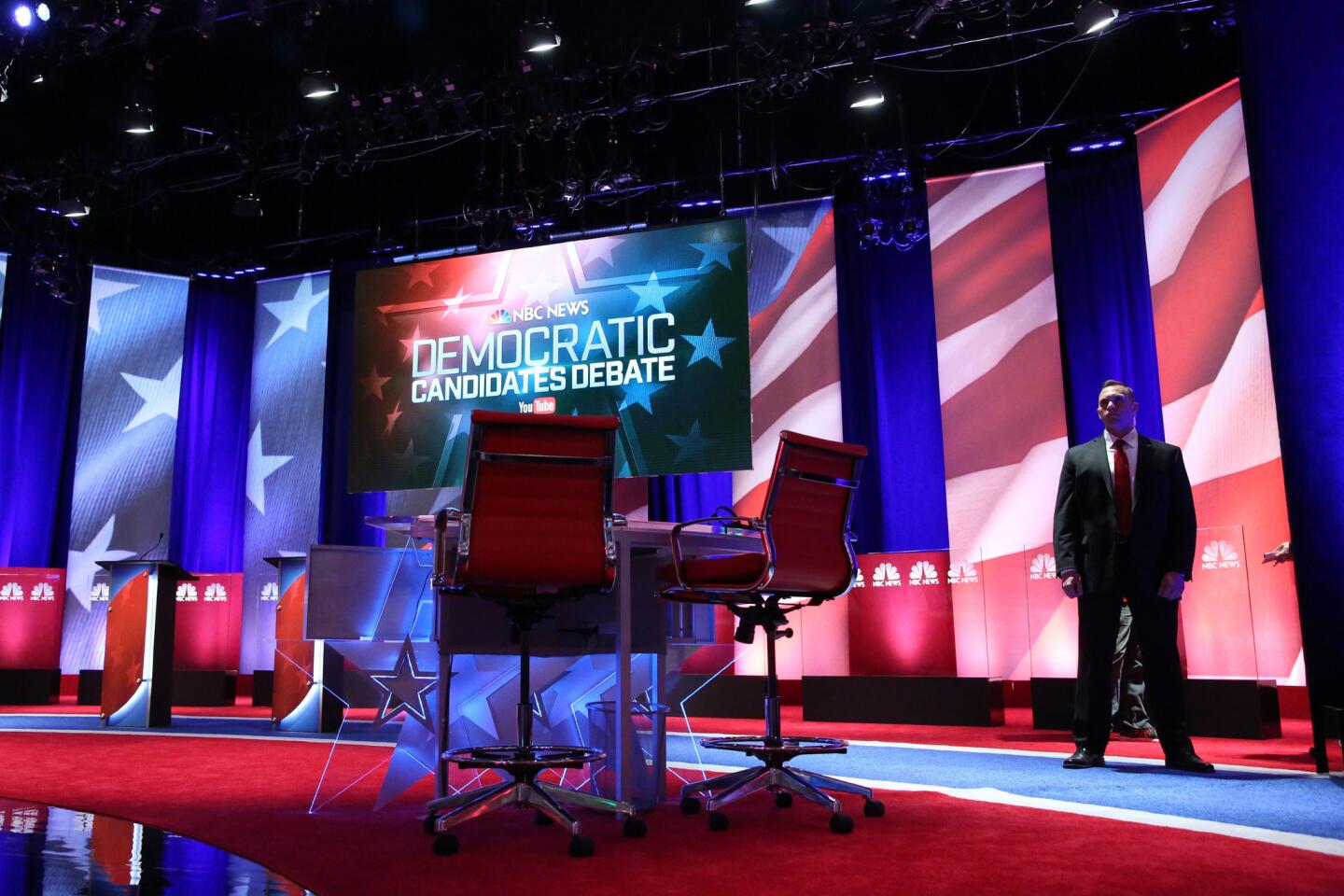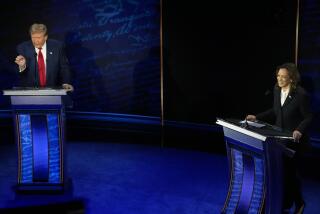Sanders, Clinton clash on guns, healthcare and Obama legacy as Democrats debate
- Share via
Reporting from Charleston, S.C. — After a succession of Democratic presidential debates that largely avoided the acrimony and personal affronts that have defined the GOP face-offs, Hillary Clinton and Sen. Bernie Sanders clashed sharply Sunday on guns, healthcare and President Obama’s legacy.
A tight race will do that. And Clinton now finds herself in one in the crucial early states of New Hampshire and Iowa. Sunday’s debate was the last such televised clash before the voting begins Feb. 1 in Iowa.
Clinton challenged Sanders aggressively. But even as she sought to reshape the race in the first two states, she seemed intent on bolstering her support among the minority voters whom she will depend on to get her campaign back on track if she loses those contests.
She particularly went after African American voters, who dominate the Democratic electorate here in South Carolina and many other Southern states that will vote over the next eight weeks, as she denounced “systemic racism” in the criminal justice system and accused Sanders of having disrespected President Obama.
Sanders had called Obama “weak, disappointing” and had talked up the idea of a primary challenge to him before his reelection in 2011, Clinton charged.
Sanders defended his support for Obama, stressing that he had campaigned for him in 2008 and saying that “we’ve worked together on many issues.
“We have some differences of opinion,” he conceded.
The subtext of support for Obama arose again as the two clashed over healthcare, where Sanders has pushed a “Medicare-for-all,” single-payer plan.
Asked about the issue, Clinton repeated an attack that she and her supporters have used increasingly over the last couple of weeks -- that Sanders’ plan would in effect “tear up” President Obama’s Affordable Care Act.
The health law was one of “the greatest accomplishments of President Obama,” Clinton said, citing the 19 million Americans who have received health insurance since the law took full effect.
“There are things we can do to improve it, but to tear it up and start over again, pushing our country back into that kind of contentious debate, I think is the wrong direction,” she said.
“Even when Democrats were in charge of Congress” in 2009 and 2010, “we couldn’t get the votes” for a public healthcare program, Clinton noted.
Sanders denounced Clinton’s attacks as “nonsense” and said that his plan would fulfill the long-standing Democratic goal of recognizing healthcare as a right for all Americans.
“No one is tearing this up. We’re going to go forward,” he said.
But despite the health reform law, 29 million Americans still do not have insurance, he noted -- a figure that includes immigrants in the country without legal authorization as well as millions in Republican-led states that have declined to expand their Medicaid programs under the health law.
Sanders also defended the taxes that would be needed to implement his plan, saying that most Americans would be better off because they would no longer have to pay insurance premiums.
Just hours before the debate, Sanders released the long-awaited details of his plan. It would impose a payroll tax of 6.2% on employers and a 2.2% flat income tax increase that would apply to all income above the current standard deduction – $28,800 for a family of four. That would be on top of several other tax increases Sanders has already proposed, most of which target taxpayers with incomes above $250,000.
Some middle-class Americans would pay “a little bit more” in taxes, but that would come instead of “paying $10,000 to Blue Cross” or other insurance companies, Sanders said.
Earlier, the two clashed on the issue of guns, a subject on which Clinton has stepped up her attacks in recent weeks. On Saturday, Sanders shifted positions on one important piece of gun legislation which had been at the center of those attacks -- a law he had voted for which gave gun manufacturers immunity from being sued by people injured by gun violence.
Asked about that shift, Sanders called Clinton’s attacks “disingenuous” and noted that he had a “D minus voting record” from the National Rifle Assn.
Pressed on his shift of position, Sanders defended his previous vote, saying the bill he supported had some good provisions, but added that he had decided to “re-look” at it.
Clinton said she was “pleased to hear that Sen. Sanders has reversed his position on immunity” but continued to hammer at his record.
“He has voted with the NRA, with the gun lobby, numerous times,” she said. “He voted to let guns go onto Amtrak, guns go into national parks” and against allowing federal research into the causes of gun violence.
Also participating in the debate was former Maryland Gov. Martin O’Malley, whose campaign continues to flounder. O’Malley’s single-digit poll numbers almost disqualified him from a place on the stage.
Although the debate focused mostly on domestic issues, the candidates expressed some differences on policy toward the Mideast. Sanders said he believed the U.S. should “move as aggressively as we can to normalize relations with Iran” while Clinton offered a more cautious assessment.
“I think we still have to carefully watch them,” she said. “We’ve had one good day over 36 years,” she added, referring to the announcement over the weekend that Iran had fulfilled its initial obligations under the nuclear agreement reached earlier this year. “I think we need more good days before we move more rapidly toward any kind of normalization.”
Sanders also said he wanted to see Iran and Russia involved in an effort to end Syria’s civil war and thought the U.S. should back away from its insistence on ending the rule of Syrian President Bashar Assad, an ally of both Moscow and Tehran. Clinton said the U.S. should not allow “Iranian troops be used to try to end the war in Syria.”
The days leading up to the debate have been marked by a series of uncharacteristically personal barbs between the leading two candidates and their campaigns. Polite policy disputes have given way to dire warnings and charges of lapsed integrity.
On guns, on healthcare, on taxes, the Clinton campaign has assertively moved to define Sanders as peddling risky and irresponsible proposals. Sanders and the media-savvy grass-roots activists who have fueled his rise are responding in kind, accusing Clinton of cynically misrepresenting the senator’s record and his vision.
“To say that I’m kind of a supporter of the NRA is really a mean-spirited, and unfair and inaccurate statement,” Sanders told MSNBC after Clinton told its sister network, NBC, that he was “a pretty reliable vote for the gun lobby.”
Top operatives for the Clinton campaign charged Sanders was among those President Obama had in mind when he warned he would not support any candidates who rejected his gun-control agenda. The White House would not confirm this interpretation.
Sanders, who represents a state with abundant hunters, does have a mixed record on guns. But many of the votes Clinton highlights were cast decades ago. He now champions most of the same aggressive gun-control measures as Clinton and Obama, and he talks about it frequently on the campaign trail.
Clinton also has been stepping up her attacks on the cost of all the generous social programs Sanders has proposed. His agenda would expand government considerably. But her campaign has had difficulty finding traction in criticizing the idea of a government-run, single-payer health plan, which is popular with many liberal Democrats.
Earlier in the week, Chelsea Clinton warned at a campaign event that Sanders’ plan would wipe out Medicare altogether.
The progressive grass-roots behemoth Democracy for America accused the Clinton campaign of talk “that is so absurdly false it’s almost funny.” And it warned her against an approach that could become so off-putting to the liberal Democrats rallying behind Sanders that they take a pass at turning out to vote for her in November should she win the nomination.
“The goal of Democrats holding on to the White House in 2016 is being made more difficult every second the Clinton campaign continues to distort the facts on Bernie Sanders’ strong record against gun violence and attack a core progressive idea like universal healthcare,” said Charles Chamberlain, executive director of the group.
See more of our top stories on Facebook >>
The latest feud to erupt between the campaigns involves an advertisement Sanders began airing late last week, in which he warns against a “Democratic [vision] for regulating Wall Street” that “says it’s OK to take millions from big banks and then tell them what to do.”
Clinton’s campaign manager and pollster summoned reporters to a conference call the day it was unveiled to declare Sanders had broken his pledge not to run negative advertisements.
“Senator Sanders is doing something he has proudly said he would never do,” Clinton pollster Joel Benenson said of the advertisement, a relatively tame spot, and one that even Benenson acknowledged was built around an argument Sanders has been making on the campaign trail for months.
In an interview taped for Sunday’s “Face the Nation” on CBS, Sanders denied that the ad was negative. “What I am saying is that there is a division within the Democratic party that has gone on for many, many years,” he said. “And I’ll let people determine whose side she is on and whose side I am on.”
Halper reported from North Charleston and Lauter from Washington.
ALSO:
A behind-the-scenes look at a Rams’ proposal the NFL couldn’t refuse
Explosion risk stalls plan to capture and burn gas from Porter Ranch leak
Her lead all but gone in Iowa, Hillary Clinton deploys Bill to win over voters
More to Read
Get the L.A. Times Politics newsletter
Deeply reported insights into legislation, politics and policy from Sacramento, Washington and beyond. In your inbox twice per week.
You may occasionally receive promotional content from the Los Angeles Times.
